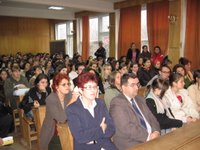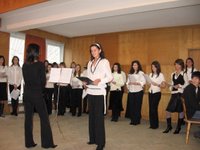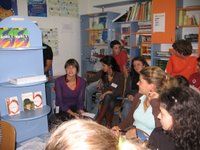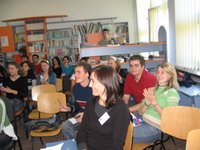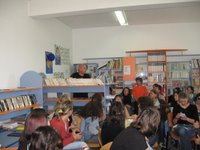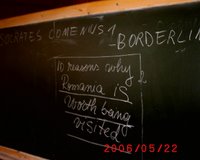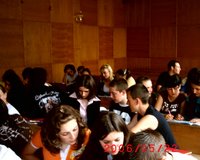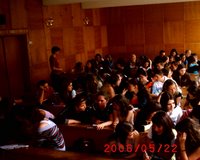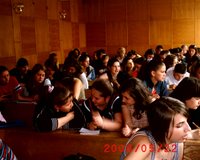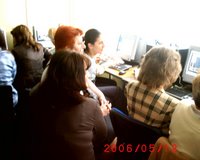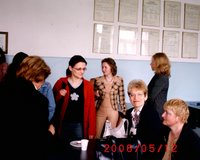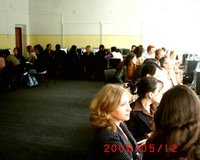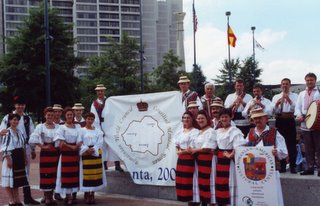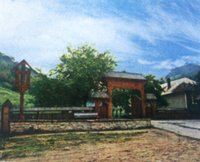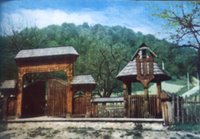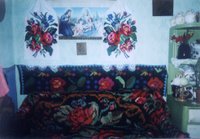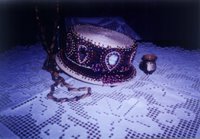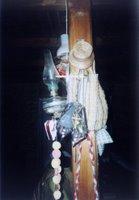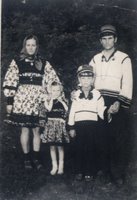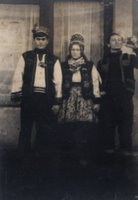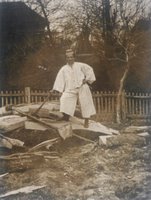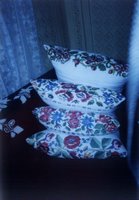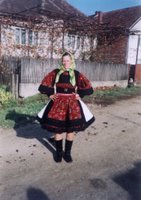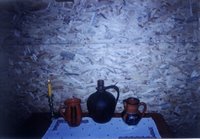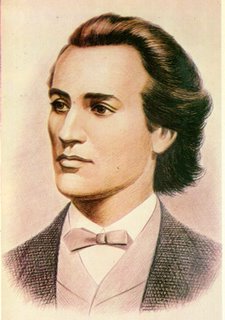This Blog was created with the ocasion of the Comenius project Borderline (2005-2007). Our idea is to continue to publish events taking place in our school.
Saturday, December 09, 2006
Calendar
Friday, December 01, 2006
Wednesday, November 15, 2006
Wednesday, November 08, 2006
Breaking Time and Space Barriers
Borderline...the wall that we built between us, the barrier that separates our minds as well as our bodies, the appearances that we must fight against.
This is what we tried to do during our meeting with our colleagues from the project. After spending a wonderful day in which each team presented its work, our school organised a trip that, by taking us back in history helped us better understand the realities that we face today; a trip that showed our integrity as Romanians and our true character as humans.
It was also important due to the fact that we travelled along our border with Ukraine, and this way we had the possibility to observe how the people that live near borders get along and how this situation evolved in time, because our borders are not the same as were years ago.
We first visited what used to be the house of a historical personality from our county, Vasile Lucaciu. Known as “the lion of Sisesti”, he was a famous fighter for the rights of the Romanians from Transylvania. The ensemble that we visited includes: the parochial house, the school and The Church of the Saint Union of All the Romanians. Lucaciu was one of the fearless leaders of the Transylvanian fight for emancipation and he was one of the people who wrote the “Memorandum”, which contained historical arguments, the motives that stood as a base for the Romanians desire: not to annex Transylvania to Hungary.
After this, we had the chance to visit the famous wooden Church from Surdesti. It dates back to 1721 and it is remarkable due to the tower’s impressive dimensions. This church is known as the highest construction of wood from the whole world, the tower measuring 54 m. The beauty of the place is increased by the marvellous interior that has paintings with scenes from the Bible.
The Museum of Ethnography and The Village Museum are important sights for any Romanian. And especially we, the people from Maramures, have a lot to be proud of when we speak about The Village Museum from Sighetu Marmatiei.
At the entrance of this museum we are „welcomed” by the symbol-monument of central Europe, the point where the 0 kilometre is marked.
The Museum is composed of peasant architectural monuments, houses and churches, arranged in a village that reconstitutes the way that these peasants lived and were organized. This place creates such a strong impression of reality, which I confess that I sometimes felt like I have barely got out from a time machine that took me back in time, to those ages.
Of great importance are also the Gates from Maramures, which, for Europe, made a considerable contribution to enriching the cultural treasure of our ancient continent. This Gates separate the sacred space of the house and its surroundings from the outside space, representing the pride of the peasant as an inhabitant of Maramures.
What we visited next is also what impressed me the most: the Memorial from Sighetu Marmatiei, and some famous words that I read there will always remain in my memory:”He, who forgets the past, is condemned to repeat it” (Santayana) and “When justice does not succeed in becoming a form of memory, memory alone CAN be a form of justice”(Ana Blandiana). These words impressed me even more after I found out the history that they refer to.
Placed in the former "Prison of the Ministers" in Sighet, the MEMORIAL of the Victims of Communism and anticommunist Resistance was opened in 1997 in the town of Sighetu Marmatiei ("Sighet") located in the far North West, in the beautiful Maramures region.
The prison, which was active from 1897 until 1977, takes its name from the period during the 1950s when it held many political prisoners (former government ministers, generals, academicians, and religious leaders - the cultural and political elite of Romania) in terrible conditions - brought here because it was thought to be particularly secure since the town was just 2km from the Soviet frontier. 180 prisoners were held in terrible conditions in 72 cells. Many were elderly but this didn't save them from beatings and punishment so it is no surprise that many died. These included one of the most respected pre-war politicians.
The Memorial Sighet was established as a reminder of the atrocities committed by the communist regime - for years the population has been brain-washed to create the so-called "New Man" through the rewriting of history and poisoning the memories of generations. Moral and civic values could only be recovered if the collective consciousness is recuperated. The Sighet prison was chosen because it was the first of many political prisons set up in Stalinist times and because it was where the country's political, spiritual and cultural elite of the pre-war democracy was exterminated.
An International Study Centre was established here because out of all of the former communist countries, Romania's experience had been the longest and most painful.
Sunday, October 29, 2006
Wednesday, October 04, 2006
Project Meeting in Baia Mare
They will be 10 teachers accompanied by:
Italy: two girls
Liechtenstein: two girls
Slovakia: two boys
Vaslui Ro: two girls
Total: 8 girls and 2 boys.
They will be hosted by:
Andra Sas
Florina Fanea
Diana Rusu
Andreea Bindea
Dana Câmpean
Karla Popp
Alexandra Mureşan
Arthur Vişovan
Alin Şuteu
Wednesday, May 24, 2006
10 reasons to visit Romania
Sunday, May 21, 2006
Interview - AXA TV

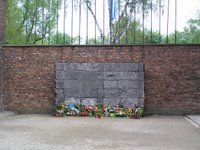
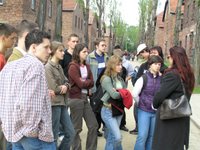
I referred to the importance of these international meetings for building a common Europe while Andrada and Alin referred to the things that impressed them most in Poland:
the people’s wonderful hospitality, the way the hosting families tried to make them feel at home.
Saturday, April 29, 2006
Marian Ilea - Vacek
The central idea promoted in this trilogy is that of transfrontier between social spheres, cultures, and ethnics. This is introducing the idea of borderline, between the characters, what they are and what they want to be.
The trilogy is structured in two sections. At first the story is narrated in a classic form, in a burlesque way and finally, using the “balzacian” pattern. The trilogy contains dramas, inspired from “Realia and Utopia” areas. It is achieved through meditation. The author explores the paradox, providing an appearance of normality.
By analysing the setting of the novel, we can notice in its development different places. This way, Medio Monte becomes an “axis mundi”, around which the characters gravitate in an inevitable way. At first they experience different states from calmness and tranquilli to that of machinery characteristic to all the inhabitants.
Vacek Syrovy, the chief policeman, from Medio Monte, is one of those, who have hallucinations, related to an Idea. Along the story, we can notice that the chief policeman seems to be deeply inflexible, when searching the source of all the evils, which had happened in Medio Monte. He thinks that bishop Joseph Kollowitch, is behind all the delinquencies and crimes that took place in Medio Monte.
“Vacek” represents an agony book. It` s the agony of an imaginary, well hold up, by the writer. The characters are reporting, themselves to the Great Mechanism, just as to a great religion. One of these characters will die, another one will escape from being marginalized, going by train to Brno. Hereby “Vacek” is a frothy book, irrational and hilarious sometimes, producing a carnival “topos”, where beneath the surface, it can be noticed a large series of funny, tragic-comic situation, and the surface structure of the text, on a second thoughts, is defined by bizarre situations, a-typically, un-centrated epic contexts.
Costin Alexandru - Daniel, XI G
Sunday, April 02, 2006
Press Release
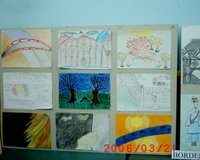
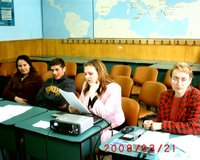

Au participat elevi ai Colegiului Eminescu precum si prof. Ligia Durus , inspector cu programele europene de la ISJ Maramures, Ileana Vasilescu, profesoara de geografie, Ramona Bencze, specialista in domeniul TIC.
Cu acest prilej a fost vernisata expozitia « Frontiere » in care au fost prezentate desene realizate de elevii Ana Susca, Magyar Kinga, Carmen Marosan, Victorita Cureu, Catalin Motoc, Oana Motica, Romana Maxim, Daniela Ciurdas, Diana Jecan, Georgiana Gogea, coordonati de catre profesoara de desen Cristina Rettegi.
In partea a doua a intalnirii a avut loc competitia pentru desemnarea celor doi reprezentanti ai Colegiului Eminescu la reuniunea de proiect din Polonia ( 9-14 mai 2006).
Candidatii au realizat prezentari PowerPoint cu temele Romania si Scriitori de frontiera.
Juriul a fost alcatuit din elevii participanti la reuniune.
Castigatorii desemnati au fost elevii Andrada Sas din clasa a X-a E si Alin Suteu din clasa a XI-E.
Cei doi elevi, insotiti de coordonatoarea proiectului, prof. Mariana Gabriela Hudrea, se vor intalni in Polonia cu echipele de la cele 6 licee partenere:
1. Liceo Scientifico Statale“Galileo Galilei”, Belluno, Italia- institutie coordonatoare
2. Liceum Ogólnokształcące,Tarnów, Polonia
3. Gymnasium, Vaduz, Fürstentum Liechtenstein
4. Liceul Teoretic "Mihail Kogalniceanu", Vaslui, Romania
5. Lycée du Granier, La Ravoire, Franta
6. Gymnazium Galejova, Kosice, Slovacia
Saturday, March 18, 2006
Project Dissemination
January 10th , 2006
TL Plus Baia Mare
Program : The Learning City
Moderator : Corina Sandor
Guest : Mariana Hudrea, teacher of English, coordinator if international projects and director, SC Info Project SRL. www.infoproject.nvn.ro
Topic: European Projects (conditions pf participation, benefits) , the importance of the study of foreign languages in a common Europe
January and February are two months in which the coordinators of European projects are very busy as February 1st is the deadline for Comenius projects and March 1st is the deadline for Grundtvig projects.
R: What kind of projects are being made and which are the benefits?
01:31- This program could be an invitation for teachers to submit project proposals
The structure of the European projects: Socrates (Comenius, Grundtvig ,etc.) , Leonardo da Vinci and Youth.
Comenius projects are dedicated to pre-university education while Grundtvig projects are dedicated to adult education.
04:02 - Presentation of the project Borderline- http://borderlin-com1.blogspot.com and http://cnme-borderline.blogspot.com
04:27 –R: How can the European programs be accessed? Why are there schools without projects?
05:16 – Benefits?
The opportunity to present your own country abroad.
The opportunity to improve the image of your country abroad.
The possibility of traveling abroad and learning things and discovering new countries.
06:00 – Description of the project Comenius Borderline; partners’ description; project reunion in France, November 2005.
Benefits for the school: the director had the opportunity to visit a modern school in France. He saw the Documentary Center, the organization of the school.
Another benefit is the teamwork.
08:00 – All the partners come to better know their own countries and the partner countries.
10:10 – The us of the Blog as a didactic tool- the possibility of publishing the students’ essays on the Internet.
Language of communication: English.
10:58 – The promotion of the study of foreign languages in Europe: the European citizens must learn foreign languages. The citizens from Eastern European countries speak very well several European languages.
11:45- In a common Europe we have to communicate among us
12:15 – I advised the French students to learn several foreign languages.
12:40 – Presentation of the project TIC-TAC (http://g2project.blogspot.com), language of communication: French. Cooperation with CJAPP and AJOFM. The aim of the project is to study how ICT can help unemployed people to find a job.
13:20 – Ioana Pop will participate at the project meeting from Rome.
14:05- Project meeting in Cherbourg. TIC TAC G2 project.
14:17- preparations for the project meeting from Italy.
So far we have elaborated a study addressed to people searching for a job to see if they use computers for finding a job.
Partners in the project are CJAPP and AJOFM.
15:35- There will be promoted a course for unemployed people in the second year of the project.
16:10 Grundtvig 1-ITEM- This project has a solid practical aspect as we are involved in producing an online course for ICT specialists.
Following the study developed in 2004- 2005 regarding the level of English as a communication tool we have discovered that the ICT specialists need such a course to improve their communicative skills in English.
Daniela Buda and Claudia Lupoian are collaborators in this project.
How are the collaborators selected? According to their wish to dedicate time to a new experience.
The partners come from Bulgaria, Hungary, Great Britain and the Check Republic.
18:30- The course piloting- May 2006
R:Which is the contribution of GB?
Linguistic expertise.We are sure we will produce a high quality product.
19:25- R: Bulgaria, Hungary and Romania are countries in which English is a foreign language. How is it to produce a an English course?
In these countries there are very good specialists in English, appreciated by the British Council.
20:01- The coordinator is from Hungary.
20:10 – Kate Fazekas is coordinating large teams of specialists in several projects.
20:25- the site of the project is very good.
20:45- The work for G1ITEM helped Daniela in learning how to use AEL program in her school.
21:19- another benefit is the team work
21:28- the description of the school from Ravoire, France and the way money is directed to schools in France . In the last 15 years in France there have been built very modern schools. Both students and teachers are calm and with smiling faces, compare d to Romanian teachers who have financial difficulties.
23-40 – But teachers are dedicated to their profession and they try to do their job.
In the French school the students read everywhere: on the staircase, in study rooms or in the Documentary Centers.
The students have their meals in the canteens together with the school staff. The local authorities sponsor the meals. There is a very well organized self-service system.
R: What didn’t you like in France?
I visited France during the riots in the suburbs. The explanation came that in school with parents belonging to the middle class, with a stable job, there are no problems. But in families of unemployed or in families with problems, the children have problems in their turn.
28:00 – By participating in European projects one learns a lot of things: how to travel, how to manage lost luggage problems, how to adapt to the customs of each country.
22:50 – Smoking is forbidden in all means of transport in France.
The strong relationship between school and family. The parents are strongly involved in the education of their children.
31:50 In Romania there have been created students’ associations. This partnership was active during the teachers’ strike in November 2005.
The message is that the whole society is invited to support school and education.
35:00 Leonardo da Vinci project- Evaluation Tools in Vocational Education.
There is a difference in perception of the term in Romania where the technical education is not included in vocational education while all over Europe it is.
Info Project is a subcontractor in the project having the task of disseminating the project. Last year we elaborated a study on the way the modern evaluation tools are known and to what extent they are used in the schools from Romania.
On the site of the Romanian Ministry of Education there are very good things. In theory the Romanians are very good.
Via the Analysis Study we realized that all the teachers who had participated in training courses are aware of the new tendencies in evaluation, while the others know practically nothing about that.
36:50- The team coordinating the Leo project is the same team that coordinated the G1-ITEM project.
37:00 – we are just involved in dissemination
We will continue the dissemination activities by participating at a new Congress, in Istanbul, organized by Istanbul University. In May 2005 we participated at a Congress in Istanbul where we presented the European projects. The interest was big, as these projects have been recently launched in Turkey.
Will teachers be able to use these new evaluation tools?
The product is being made exactly for this purpose.
What subjects could use such tools?
All subjects.
39:20_ The coordinating institution from Hungary organizes courses of ICT for disabled people, for example. We visited this school in 2003 and we were impressed by it.
This project meets the requirements in modern evaluation today.
40:00- Grundtvig 2 projects- The history of the project at the School of Arts from Baia Mare, a follow up of a previous G2 project. The same thing happened with Patre Dulfu County Library from Baia Mare which is also involve d in a G2 project as a continuation of the previous G2 project coordinated by us: “Active involvement in Nationl and European projects of retired or newly retired people”.
43:25_ Esperando Association, as association for disabled people also benefited of consultancy from Info Project.
43:35: we offer consultancy for European projects to all the people interested.
44:14- R: How can be written good projects?
44:28 - The secret is to speak foreign languages and to use the computer as a communication tool.
45:44 – These projects are not only for teachers of foreign languages. A good example is the European Schoolnet where one can see projects developed by teachers of Math, Physics, and Chemistry. I had been involved in an evaluation team for E-Awards and I noticed that there are many Romanian teachers of different subjects involved in creating websites.
47:28- We organize courses of foreign languages
47:43- There are 3 centers of foreign languages in Baia Mare: ECHO. EDUCONS and INFO PROJECT.
48:08 – Info Project has established a partnership with ECHO for promoting TOEIC and TFI tests.
In cooperation with the French Cultural Center from Cluj Napoca we organize courses of French for people willing to go to Canada.
48:36- Today, the learning of foreign languages is a must.
We do not mean only English. The European citizens must learn French and other European languages.51:00-R: As a conclusion, the Learning City is also learning through projects and foreign languages.
Tuesday, March 14, 2006
Living Along the Borderline
Borders mean to me the possibility of meeting new people, new habits, or other ways of life or thinking.
I cannot imagine learning something from borders without tolerance.
I had been living in a border town for 15 years and I met and lived with so many people so different from me.
They are Hungarians (the majority), Ukrainians, and Russians. They all have different life styles but if you respect them you'll see that so many good things can be learnt from them and finally you don't think at all that you are different from them. You don't think that they are "the others".
In my opinion borders mean accepting the others’ life style and taking from it the good aspects and learning from the bad ones. These two concepts, border and tolerance, cannot go one without another.
The other days I had a conversation with my uncle from the USA.
I asked him to buy me a CD with 50 cents and he asked me: "Do you like those music?? I can't believe that! They are like our gipsies!!"...And suddenly I discovered that he is not a tolerant man at all and he should be because "the Negroes" never did anything to him. I believe that he doesn’t know anything about them so he never got through this border. And it's a pity. I am sure that if he had wanted he could have learnt many things from them as I have from our minority groups..
Crossing borders means travelling with your mind all over the world and learning as much as you can. I am proud that I am a tolerant person and that I have crossed borders. This is a very important thing for me and I think it should be for all of us.
Friday, March 10, 2006
A World Without Borders
Let's say that we would hear that a country, no one knows where, is going to move its borderline because someone thought that his real place might be 3 kilometers away from that place.
A part of this people who would hear the news would say "...well it is not my business, they know what they are doing…”.
I would say “…it is my problem, it is our problem, because for so much time they put a border between us…”.
In fact, what is a borderline?
Thousands of years ago, in the prehistorically time, people didn’t have borders, they were only human beings fighting to survive.
Now we have to survive but in another world, in a world full of borders.
It is strange how, in a democratic world, we are closed, our liberty is closed.
There is a thing that they didn’t close between the borders.
Who didn’t think at a utopist world, a world without borderlines and a world where people are equals?
It would be wonderful, but till then no one can take our knowledge and the most important thing, no one can take our dreams.
TRIF COSAN MARIA
Sunday, March 05, 2006
Meeting a Frontier Writer - Students' feedback
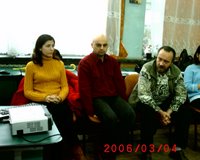 Raluca's feelings
Raluca's feelingsIt is said that one person can change your life for ever … and that was the feeling I had a few moments after meeting Mr Marian Ilea –the writer, the most extraordinary human being I’ve met in my entire life.
It is strange how a person (of whose existence you’ve never known before) can influence you that much so as to see life in a different light and also to make you feel free to give your opinion on subjects on which I, honestly did not even dare to reflect. Mr Ilea “freed” my mind and starved, as it was, he started to nourish it… He had a lot of things to share with us but the only problem seemed to be the time even though he did not show to even believe in the existence of time, as a notion, after all.
Our gift- because Mr Ilea was supposed to be a gift (it was more than that!!!!) surprised us all firstly due to his natural and surprisingly normal presence. Through his way of behaving he helped us discover that all writers are in fact tangible presences and why not even humans, and definitely not immortals or any other supernatural existences. Moreover he helped us enter into Romania’s literary society and he also gave us the chance to know it as it is and not how we’ve been told to from our teachers. Now I do know that we, Romanians, have a rich and of high quality literature and that (some of) today’s Romanians writers can actually be very good. In this respect, Mr Ilea’s words made me understand that our generation can do a lot of things in order to help these modern writers. Their works have to be known and advertising is the key!! If we (lucid beings) encourage, through the media, people to read works of high quality and if we show them which is the standard for quality our culture will be saved!!!!!!!!!
So, Mr Ilea, I’m very looking forward to reading your books and not only, and I promise you I’ll do my best to always choose quality and to admire (even if you do not approve) the writers that are worth being admired. Because, you see, despite all that you’ve said the writer remains covered in a heavenly and magical obscurity. Finally, I’ll have to disapprove you, Mr Marian Ilea- the writer, and say that being a writer is more than having a job; and I’ll say this in Romanian too: A fi scriitor e mult mai mult decat o meserie!!! It’s knowledge through which writers like you keep people like us alive!
Raluca Popa
I start by saying that the meeting on Saturday, 04.03.2006 was the best experience of my life. It was my first meeting with a writer.
I was very pleased to meet Mr. Marian Ilea.
I think that I could have stayed and listened to him for hours and hours and I would have wanted more.
I liked very much the way he was talking to us. It is a very open-minded person. Mr. Marian Ilea fascinated me completely, and he raised in me the interest for literature. I was really impressed by the familiar way Mr. Marian Ilea behaved.
I must admit that at first when I found out that a frontier writer was coming I was a little bit nervous, but as soon as I saw him and he started to talk, I was all ears and soon I noticed I wasn’t nervous any longer. I must say that I wanted very much to ask him a question but I was too impressed to think of one. Mr. Marian Ilea made me very curious about his books, especially “Desistea”, and I will certainly read it.
Besides the incredible meeting with Mr. Marian Ilea, the whole meeting on Saturday was great. Mrs. Mariana Hudrea is a great person, and even if I didn’t know her before the meeting, I can say that she is the best teacher. A person who cares for her students. After the meeting I can say that I don’t regret at all that I am involved in this project.
On the 4th of March 2006 I lived the most unbelievable experience in my life .
It was such a joyful Saturday for me.
Even if the meeting we had been invited to attend was programmed for only 1 hour, we got out of there after three and a half hours.
And you know why? Because we felt very well together. I could even say that after that meeting we are just like a small family: “the borderline family”.
I like very much my colleagues from the project. Even if we are in the same high school, I didn’t have the chance to really know them, to see how they live, what their feelings are. But after this meeting I felt closer to them.
This part of Romania has the borderline with another Eastern Europe country, Ukraine. This part of Romania is known in the whole country as a place full of history, full of traditions and with very charming people.
Some Ukrainians, living in Romania, are students at Colegiul National “Mihai Eminescu”, Baia Mare, and with this occasion, I had the opportunity to be in contact with them , to see how they feel in Romania , and I also want to know if Ukraine is different from ours and in which way. Most of the people say that if you live in a borderline county you aren’t very familiar with the real world and you are isolated. But those words aren’t true at all. I feel very good in my county, because my friends are here, they help me whenever I want, and in my county the people are very respectful with the strangers, and very warm to them.
So, if some of you, who read this essay will visit my county, you should know that in this part of Europe you will find all you need to fill at home, because you will be surrounded by the Romanians people , a very friendly and good nation.
We will wait for you in Romania, to visit Maramures and it’s surroundings!
Alin Suteu 11 G
Mirela Campeanu 11E
Thursday, March 02, 2006
Meeting a Frontier Writer
For this reason the language of communication of this meeting will be Romanian.
Programul întâlnirii din data de 4 martie 2006
Participanţi: elevi si cadre didactice implicaţi in proiectul FRONTIERE
Invitat de onoare: scriitorul MARIAN ILEA
10:00 Prezentarea tematicii proiectului şi a partenerilor de proiect
10:15 Evaluarea etapelor parcurse materializate în produse ale proiectului
10:30 Intervenţia scriitorului Marian Ilea referitor la tema „Scriitori de frontieră”
11:00 Discuţii
11:30 Propuneri făcute de elevi referitor la pregătirea reuniunii din Polonia
BORDERLINE
(The frontier: a no man’s land, a passage way, bridge and barrier between people, countries, stories)
Frontiera- ţinut al nimănui, o cale de trecere, punte şi barieră intre oameni, ţări, povestiri
Proiectul BORDERLINE este un proiect Socrates Comenius1, finanţat de Comisia Europeană.
Parteneriatul european este format din 7 instituţii de învăţământ din 6 tari.
Liceo Scientifico Statale“Galileo Galilei”, Belluno, Italy- Coordinating institution
2. Liceum Ogólnokształcące,Tarnów, Poland
3. Gymnasium, Vaduz, Fürstentum Liechtenstein
4. Colegiul National "Mihai Eminescu", Baia Mare, Romania
5. Liceul Teoretic "Mihail Kogalniceanu", Vaslui, Romania
6. Lycée du Granier, La Ravoire, France
7. Gymnazium Galejova, Kosice, Slovakia
Proiectul îşi propune abordarea ideii de frontieră, atât din punct de vedere fizic cât şi metaforic, ţinând cont de definiţiile pozitive ( un pod/punte spre ceva nou, un loc al posibilităţilor), de cele problematice ( frontiera ca barieră, limită, obstacol) şi chiar cauzatoare de conflicte ( problematica alegerii şi a apartenenţei).
Proiectul se apropie de teme cum ar fi cunoaşterea celor diferiţi de noi, respectul faţă de ceilalţi, sensul identităţii.
Pe de alta parte , în timp ce respectăm caracteristicile individuale , proiectul tinde să introducă valorile absolute de integrare, inter- culturalitate si teritorialitate.
Toate acestea se realizează printr-o cercetare care implica diferite aspecte şi se bazează pe date obiective ( in special istorice, economice si legale), dar si pe interpretarea experienţelor de viaţă, a povestirilor şi a mărturiilor exprimate prin diferite forme ale atei.
Rezultatele aşteptate se pot exprima pe de o parte prin cunoştinţe dobândite în termeni de dezvoltare umana, şi pe de alta parte, de dezvoltare culturală.
Obiectivul principal pe care dorim să-l atingem este o educaţie spre o Europă fără bariere şi graniţe, fără obstacole care sa limiteze dialogul intre popoare.
Wednesday, March 01, 2006
Romanian Frontier Writers
- Tristan Tzara - 7 manifeste dadaiste
- Nicolae Breban - Elegii pariziene, Sensul viatii- Memorii
- Max Blecher - Intamplari in irealitatea imediata,Inimi cicatrizate, Berck, orasul damnatilor
- Mircea Eliade - Isabel si apele diavolului
- Mircea Cartarescu - De ce iubim femeile
- Mateiu I. Caragiale - Remember, Pajere
- Macedonski - Thalassa, Noapte de decembre
- Mihail Sadoveanu - Divanul persian sau Galceava inteleptului cu lumea
- Nicolae Breban- Elegii pariziene, Sensul vietii
- Dumitru Tepeneag - Maramures, Hotel Europa, La belle roumaine
- Ioanes Pop - Ieudul fara iesire
- Marian Ilea - Medio Monte, Vacek, Libertatea incepe in 7 aprilie
- Stefan Agopian - Fric
- Eugen Simion - Jurnal parizian. Timpul trairii - timpul marturisirii
- Mihai Eminescu - Avatarii faraonului Tla
- Panait Istrati - Nerantula, Kira Kiralina
- Ion Barbu - ciclul Isarlak
- Serban Foarta - Bestiarul fabulos, Cantece pentru Phoenix, Cantafabule
List drafted by Daniela-Monica Sitar-Taut, teacher of Romanian
Saturday, February 04, 2006
Romania and its image outside the borders
1. Romania… a magic land of traditions, customs and moral values preserved here for centuries…an amazing country with an indescribable beauty of the landscape and a large variety of the relief, combining stately mountains, rolling hills and fertile fields. A place where time seems to have stopped in order to admire itself the wonders of this nature…also including Maramures, a region with magnificent wooden churches, traditional music, colourful costumes and ancient festivals, where rural ancient life appears to have remained intact.Nearly all the travellers are impressed with the general warmness and friendliness people here tend to welcome them; and if a tourist shows any interest in their country and wants to know more about its history or culture, Romanians will gladly offer to help him (in villages, he even might be invited into someone's home).Unfortunately, this truly world treasure is barely known outside the borders, and, paradoxically, many people from other countries seem to have a different and negative view about it. Not only is it seen as an underdeveloped country, but also some foreigners tend to question its political, social, economical values and its possibility to join the European Community.Their doubts- supported by a former difficulty of catching up with the standards of the Europe (partially due to the Ceausescu's Communist dictatorship, which had isolated the country from the West) - do not have anymore a real basis as the Romanian government together with the population are doing their best to lay by their country to the European standards .In this context, problems like the tension between the minority groups and the rest of the population or the high number of homeless children and orphans are getting a particular attention (besides corruption, for example), but not the needed one. Furthermore, a slight change in the attitude towards the minorities and a re-evaluation of the priorities and values will be appropriate, meaning an important step to a modern Romania.If these problems are worked out, the country's image outside the borders will be automatically improved. The Romanians will not be seen anymore as thieves, having no sense of good manners and begging in the streets, but in their real image: nice-looking, strong-minded and proud about their natural heritage and culture.Only then, Romania will be appreciated to its real value. It will offer the world its cultural and natural heritage and it will develop more its sense of identity.
2. A REALITY
3.How are we (as people/country/ nation) and how do the others see us?
5. HOW ARE WE AND HOW DO OTHERS SEE US?
In conclusion, we need to spend more money and efforts on education, health, fighting poverty and corruption and the positive results will not be late.
Tuesday, January 31, 2006
Thursday, January 26, 2006
Transfrontier Pollution
Following the discussions we had as part of the debate on the pollution of the environment, during Mrs. Camelia Duta’s optional Biology classes, the theme of pollution had a strong impact on the participants. They became aware of how serious the problems concerning the environment are, and also that new solutions should be found to improve the quality of the environment as well as to protect it.
As far as the accident on the Tisa is concerned, we feel that this incident, as serious as it was, was presented on the media as far more devastating than it really was. We do not want to show indifference to the accident by saying this; we only want to stress the fact than the gravity of the accident was exaggerated due to state problems as well interference, from the border.
We deeply regret the accident, and we believe that it is extremely important that the area on the Tisa, which was affected, should be cleaned and rebuilt as soon as possible.
To this purpose, we, together with our coordinator, Mrs. Camelia Duta, went on a trip on the Tisa, to document and father information about the seriousness of the situation. We are committed to take part first hand in rebuilding the area, our participation in such activities being constant. A proof of this stands our contribution to the “Mihai Eminescu” reservation in Seini, which was extremely beneficial. We wish our contribution to this project to be the same, in the hope of a fast rehabilitation of the area.
The resources of this planet are more and more limited, and beside the fact that they are used in an abusive way, they’re also polluting. The pollution worries me, about the quality of living, and the fact that some people are not responsible, and, by not taking care of their responsibilities, they help increase the pollution. It all starts from people’s mentality, starting with the normal citizens, and ending with the big polluting factories. Very few are the people who really care about the surrounding environment, and most of them don’t bother to think about the consequences that may occur in the future, because of their irresponsibility. Some people, for example, think that a paper or a P.E.T doesn’t affect the environment in any way, and even if it does affect it, they think that there are others in charge to repair that; not to mention the big factories, witch only want to gain a big profit, even if that means destroying the environment.
The effects of the pollution are terrible. One of the worse effects is the influence of the pollution over the health of people. Pollution caused loss of a lot of lives, caused lots of diseases, genetic malformations and also destroyed the flora and the fauna, which is an essential element in the survival of the human species on Earth. In most countries, including Romania, pollution is a major problem in which, even if, theoretically, we do have the solution, it can’t be reached because our country doesn’t have modern technologies, which could help reduce the pollution. The process of recycling some products is a good start in reducing the pollution. For example, in the paper producing, there are some processes that pollute, but by recycling, we save the green gold, witch is the forest, witch, unfortunately, for some people, this doesn’t represent a source of life, it represents only a source of income. Another worse effect is global warming. Researches proved that pollution is the first thing responsible for the global warming, and there’s no sense in mentioning the negative part of the global warnings: the meteorological phenomenon and the variations of the temperature, which directly affects the life on Earth.
Even if some of the pollution’s effects are totally irreversible, I still believe tat the Earth is not yet doomed, and by training of the population about how the pollution directly affects health and environment, positive changes could and will occur.
Adrian Grigorescu, 11th form B
As far as the accident an The Tisa is concerned, we feel that this incident, as serious as it was, was presented on the media as far more devastating than it really was. We do not want to show indifference to the accident by saying this; we only want to stress the fact than the gravity of the accident was exaggerated due to state problems as well interference, from the border.
We deeply regret the accident, and we believe that it is extremely important that the area on the Tisa which was affected should be cleaned and rebuilt as soon as possible.
To this purpose, we, together with our coordinator, Mrs. Camelia Duta, went on a trip on the Tisa, to document and father information about the seriousness of the situation. We are committed to taking part first hand in rebuilding the area, our participation in such activities being constant. A proof of this stands our contribution to the “Mihai Eminescu” reservation in Seini, which was extremely beneficial.
Alexandra Faje ,11th B
Friday, January 20, 2006
Monday, January 16, 2006
Tolerance vs. Intolerance
Tolerance is a word often used in speaking, at T.V or in newspapers.
But are we really tolerant each other? Are we tolerant with our neighbors, with our friends, with our people?
How would be this world without peace, without tolerance?
We have more than other people in this world could dream about. We have love, we have friends, we have a family and all support that we need and we are still considered as poor people. Imagine that thousands, perhaps millions of children in this world who don’t have a family, not mentioning friends and love.
So, how would be this world without tolerance, better or worse?
Tolerance is based on respect and when the respect is missing tolerance has not the same meaning. We should respect each other. Respect means not only to help an old lady to cross the street but also to understand that a child that you see at a corner of a street for begging is not there because he wants to be there but he is there because he doesn’t have money to buy food for him and for his family. And all this is not necessarily happening because his mother or his father doesn’t want to work but because no one has offered them a job.
Some of us would say “Oh, this is his problem, not mine”. But it is our problem, our major problem.
We should learn to be tolerant one to another because this is the major problem of this century “to be tolerant or not”.
TRIF-COŞAN MARIA,
Form 11th C
Tolerance vs. Intolerance
The notion of tolerance as we understand it today is, first of all, a need of today’s modern society. It is the element that unites all links of a chain that is supposed to form the basis of a perfect society, a united world- a Utopia.
Although tolerance has an overwhelming importance at all the levels of the society and is still a word that produces many disputes and serious talks, there is, surprisingly or not, nothing easier than being( and acting!!!) tolerant. Tolerance is –or at least it should be-, a natural response generated by our own mature and advanced minds and conscience. Are we, the people of the 21st century, tolerant? If not, are we at least trying to be? Are we to blame intolerant people?
It is a reality that sometimes tolerant people change into intolerant, ignorant or even worse due to the behaviour or actions of the persons they have tried to accept. Yes, we are tired of being deceived, taken in by those to whom we have put our trust in. Let’s take for example gypsies. They are in a way or another responsible for the bad impression other nations have on us. We gave them more than a country and in return they destroyed our reputation and deleted hundreds of years of Romanian history and culture from the other peoples’ minds. However, I have personally met extraordinary and successful persons who are gypsies and they made me change my attitude towards them.
There are Gypsies and Gypsies, Romanians and Romanians, Hungarians and Hungarians, English and English… Every country has citizens of which the country is proud of and citizens that must be accepted and… helped but everything within its limits. We have to be tolerant in order to live a happy life; we have to care for the needs of the other, accept his/her beliefs, way of life, traditions and encourage the others to do the same thing. The key is to know how to tell a good and honest man from a pack of starving wolves.
The truth is that we must be more than tolerant; we have to learn what acceptance is and really give our best to change things for the better.
Raluca Popa,
11th C form
2. TOLERANCE VERSUS INTOLERANCE
A peaceful and happy life requires love, understanding, and respect. To live in harmony means to accept other people’s beliefs and hobbits without criticizing, even if we sometimes disagree with them.
It is very important for us to understand that we are all different: we look different, we think different and we live in different ways. But we are all humans, we all have feelings and we feel frustrated and attacked if the society doesn’t understand us or – even worse – it rejects us.
This is, unfortunately, the case of gipsies from Romania. It is maybe one of our greatest mistakes: we are highly intolerant with gipsies, and we have been like this from the very beginning, without offering them a real chance to prove we are wrong.
It is true that they do a lot of illegal things, such as stealing, fighting, taking drugs or even killing. But have we once – at least for a second – thought that all these could be provoked not only by them, but also by our intolerant behaviour?!
To be honest, I have to admit that I was also very intolerant until we discussed this matter in class. Then I realised how wrong I had been judging the gipsies and I started reading more about them and thinking about their situation.
Lately, there are more and more negative aspects, which are getting worse every day, between gipsies and the rest of the population. One of our biggest mistakes – say the specialists in this field – besides intolerance, is that we do not make the difference between the two kinds of gipsies. When we pronounce the word ”gipsy” we only think of all those stereotypes that we have created for them: „gipsies thieves”, „violent gipsies”, „beggars gipsies”, „illiterate gipsies”, „gipsies infractors” or „gipsy Mafia”. And these stereotypes can be misleading, because not all the people from a nation are the same. Just like there are bad Romanians as well as good ones, there are also good gipsies. We should not only see their bad aspects, but also the good ones. We should appreciate them for their talents. For example, they can be great singers, and also very smart. We only have to give them the chance to prove it, to prove that they deserve a better treatment.
In time, we had made a lot of mistakes concerning their problems, to which we haven’t paid enough attention. The local offices didn’t contribute to stopping the attacks over the gipsy communities and – worse – they even encouraged the violent attacks that took place, through passivity and tacit agreement. The government authorities are known for the frequent encouragement of violent acts made by the Civil Guard.
The discrimination and intolerance also appears in education. The gipsy community is the least educated minority from Romania. Most of the gipsies who went to school only finished four or eight classes. Very few managed to finish high school and even lesser graduated a university. The number of illiterates from the gipsy community is unfortunately very high: 44% of the men and 59% of the gipsy women are illiterate.
But we can’t blame only gipsies for that, as they were always criticized and isolated, but very rarely helped. The gipsy children are always discriminated because of the way they are dressed. Poverty is regarded as a synonym for stupidity and, therefore, many gipsy children are isolated in the back of the class and ignored. Due to this kind of cruel treatment and because of the poverty, the gipsy children rarely finish school and that is way it is difficult for them to find work. This is one of the causes of the increase in delinquency and poverty. That’s why we should also be interested in their education and we need to create conditions where they can learn and adapt.
The members of this minority have to face a lot of problems, regarding all life’s aspects. In the past they were treated as a property which can be sold or bought, just as the owner wished, and they were considered inferior beings, that had no feelings. Their life today is not very different and their position in society hasn’t at all improved. Their low standards of life, the lack of water and electricity as well as their unawareness concerning the importance of hygiene lead to the extension of diseases and to a high rate of infantile mortality.
The conclusion I drew from all these is that we must give up intolerance. If we truly want to solve these problems, the effort must come from both sides – our community and the gipsy community – because throwing the blame on each other is only a certain path to failure. Radical changes are necessary, not only in the gipsy communities, but also outside them. We mostly need a change in mentality. The authorities should show a deeper understanding of the problems and should offer more support. But , in most cases, we all have to get over our prejudices.
Alisia Muresan, Clasa a XI-a C.
Sunday, January 15, 2006
Mihai Eminescu, Romania's national poet
Mihai Eminescu
( January 15, 1850 - June 15, 1889)
Ce-ţi doresc eu ţie, dulce Românie,
Ţara mea de glorii, ţara mea de dor?
Braţele nervoase, arma de tărie,
La trecutu-ţi mare, mare viitor!
Fiarbă vinu-n cupe, spumege pocalul,
Daca fiii-ţi mândri aste le nutresc;
Căci rămâne stânca, deşi moare valul,
Dulce Românie, asta ti-o doresc.
Vis de răzbunare negru ca mormântul
Spada ta de sânge duşman fumegând,
Şi deasupra idrei fluture ca vântul
Visul tău de glorii falnic triumfând,
Spună lumii large steaguri tricolore,
Spună ce-i poporul mare, romanesc,
Când s-aprinde sacru candida-i vâlvoare,
Dulce Românie, asta ţi-o doresc.
Îngerul iubirii, îngerul de pace,
Pe altarul Vestei tainic surâzând,
Ce pe Marte-n glorii să orbească-l face,
Când cu lampa-i zboară lumea luminând,
El pe sânu-ti vergin încă să coboare,
Guste fericirea raiului ceresc,
Tu îl strânge-n braţe, tu îi fă altare,
Dulce Românie, asta ţi-o doresc.
Ce-ti doresc eu ţie, dulce Românie,
Tânără mireasă, mamă cu amor!
Fiii tai trăiască numai în frăţie
Ca a nopţii stele, ca a zilei zori,
Viaţa în vecie, glorii, bucurie,
Arme cu tărie, suflet românesc,
Vis de vitejie, fală şi mândrie,
Dulce Românie, asta ţi-o doresc!
Monday, January 09, 2006
Thursday, January 05, 2006
Essays on Romania
Colegiul National Mihai Eminescu Baia Mare
“ How are we and how do the others see us?”
Conclusions on the essays written by students
In December 2005 I asked all my students from Mihai Eminescu National College , Baia Mare, Romania, to write an essay on our country with the title “ How are we and how do the others see us?”
The idea of such an essay came from Mrs. Roxana Pruncu, the project coordinator from M. Kogalniceanu Highschool, Vaslui, Romania.
Willing to get very honest and sincere opinions from my students I refrained myself from giving them indications. I just asked them to write an essay on the above-mentioned topic.
To my greatest surprise I noticed the students wrote very interesting essays.
The students were so respectful and treated the subject with incredible seriousness.
All the essays were politically correct. That does not mean they were not critical whenever the case.
The students tried to be objective and their opinions were well balanced pointing out both positive and negative aspects. However I have noticed sometimes that their opinions are strongly influenced by the newspaper articles and television programs. They used the same stereotypes and clichés.
That is mostly because most of them did not have the opportunity to travel abroad or meet foreigners.
It is interesting to notice that those who actually met foreigners and those who did not, both have complained on the bad image of the country abroad, considering that a very frustrating thing. According to all of them this image is mostly due to the behavior of some of our citizens.
They have complained about some gypsies and beggars who do not behave properly. I have noticed here a lack of tolerance.(That is why I have already asked them to write a new essay on tolerance. This time I have invited them to try to control their feelings and teach themselves how to be more tolerant towards certain ethnic groups.)
They all believe that because of the behaviour of the above mentioned groups the European citizens have such a bad opinion on Romania and on the Romanians.
They have all pointed out the fact that once the Europeans get into contact with other Romanians or once they get into direct contact with the country, they totally change their low opinion on us.
Some of them have pointed out the fact that because of communism our country’s development was slowed down.
They are all proud of the fact that Romania is part of NATO and our soldiers are actively involved in peace missions all over the world.
They are also looking forward to becoming members of the European Union in 2007.
They try to find explanations of the high number of Romanians who work abroad pointing out the fact that most of them are forced to do that in order to assure a better life for their families, considering this situation temporary.
They are proud to be Romanians and they strongly believe in the future development of the country.
They believe in democracy and in a prosperous future.
They do not forget to mention the geographical beauties of the country, the touristic potential and they are proud of the national cultural values. They are proud of our historical past. Communism is seen as the single dark period in our history.
They are proud of our great musicians, writers, painters, and sportsmen.
They like the fact that the foreigners love the way we keep our traditions alive.
As a conclusion I can say that the young generation is fully confident in a better future.
I must admit, when I gave them the task, my expectations had been quite different.
I did not think they could be so mature and so optimistic regarding the future of Romania.
Now I am confident that the young generation will definitely improve life in Romania in the near future.
Mariana Gabriela Hudrea
Project coordinator
